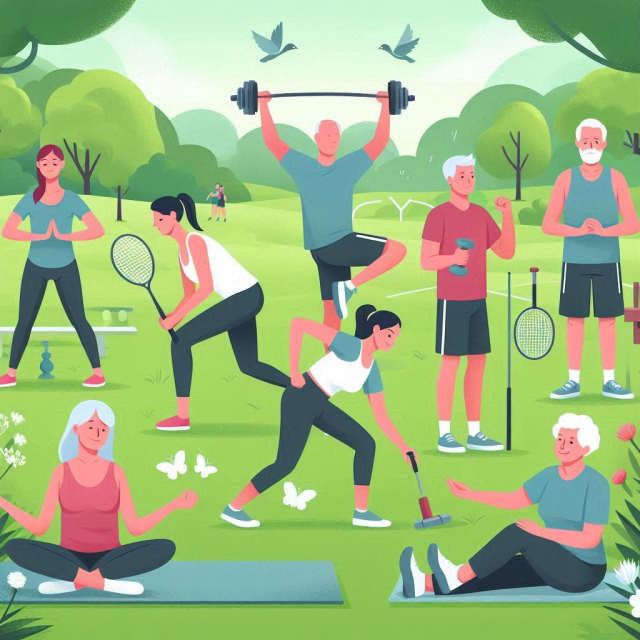Physical exercise is an essential part of a healthy and balanced lifestyle. More than just a physical activity, exercise represents an investment in our physical, mental and emotional well-being. In this article, we will dive into the world of exercise, exploring its importance from different perspectives and highlighting how it can transform our lives for the better. From the physical benefits to the positive effects on mental and emotional health, we will cover each aspect in depth and offer practical advice to incorporate exercise into our lives in a sustainable and meaningful way.
The Importance of Exercise for Physical Health.
Regular and adequate exercise is essential to maintaining physical health throughout our lives. It's not just about looking good, but about maintaining a strong, resilient, active and healthy body that can face daily challenges and stand the test of time. Here's a deeper look at the physical benefits of exercise:
Improved cardiovascular health:
Aerobic exercise, such as running, swimming or cycling, strengthens the heart and lungs, improving blood circulation and reducing the risk of heart disease and stroke.
Weight control:
Regular exercise helps burn calories and maintain a healthy weight. It also increases metabolism, making it easier to lose weight and prevent unwanted weight gain.
Strengthening muscles and bones:
Resistance exercise, such as weight lifting, strengthens muscles and increases bone density, reducing the risk of osteoporosis and fractures.
Increased energy and endurance:
Regular exercise increases physical endurance and energy, making you feel more alert and active throughout the day.
Mental and Emotional Benefits of Exercise.
In addition to its physical benefits, exercise also has a profound impact on our mental and emotional health. Remember that you are doing this for yourself, not for anyone else. From reducing stress to improving self-esteem, here are some of the most notable benefits:
Reduction of stress and anxiety:
Exercise releases endorphins, known as happy hormones, which help reduce stress and anxiety. Additionally, physical activity provides a healthy escape from daily stress and allows the mind to relax.
Mood improvement:
Regular exercise is associated with a reduction in symptoms of depression and anxiety, and has been shown to improve overall mood. Physical activity releases neurotransmitters such as serotonin, which play a crucial role in regulating mood.
Increased confidence and self-esteem:
Regular exercise can improve our self-perception and strengthen our confidence and self-esteem. By achieving fitness goals and experiencing physical improvements, we gain a sense of accomplishment and empowerment.
Integrating Exercise into Daily Life: Practical Tips.
Incorporating exercise into our daily routine may seem challenging at first, but with determination and proper planning, we can all find ways to make it happen. Here are some handy tips to get you started:
Find activities you enjoy:
Choose activities that you like and have fun with. Whether it's walking, running, swimming, dancing, or playing team sports, finding something you enjoy will make it easier to stay engaged in the long run.
Set realistic goals:
Start with small, achievable goals, such as exercising for 30 minutes a day, three times a week. As you become more confident and stamina, you can gradually increase the intensity and duration of your workouts.
Make exercise a priority:
Make exercise a non-negotiable part of your daily routine. Schedule your workouts as you would any other important appointment and treat them with the same seriousness.
Find a workout buddy:
Exercising with a friend, family member, or coworker can be motivating and fun. Additionally, having someone to share your successes and challenges with can provide invaluable support.
Vary your workouts:
Keep your exercise routine interesting and challenging by varying your workouts. Try different activities, such as strength training, yoga, Pilates, or group classes, to work different muscle groups and keep your body and mind engaged.
Don't be discouraged by setbacks:
It is important to remember that we all have bad days or difficult weeks. If you skip a workout or don't reach a goal, don't get discouraged. Instead, remember that every day is a new opportunity to start over and move forward.
Exercise is much more than a physical activity, it is a powerful tool to improve our health and well-being at all levels. From strengthening our hearts and muscles to improving our mood and self-confidence, the benefits of exercise are abundant and transformative. By integrating exercise into our daily lives consistently and sustainably, we can cultivate greater physical, mental, and emotional health, and live fuller, happier lives in the process. Remember that every step counts, and that the journey to a more active and healthy life begins with the first step. So get going and make exercise an integral part of your daily life.






